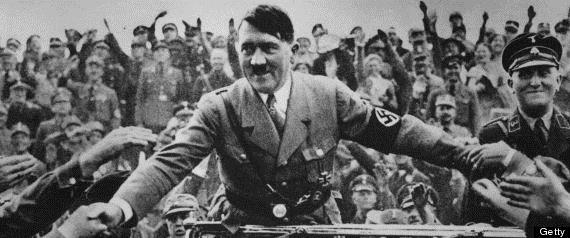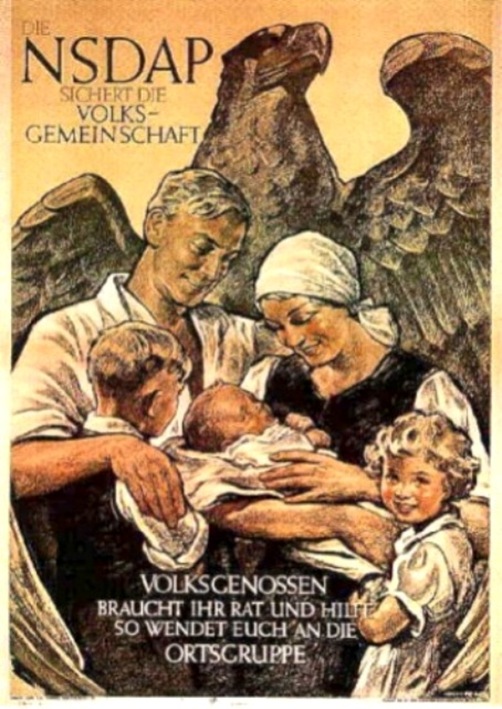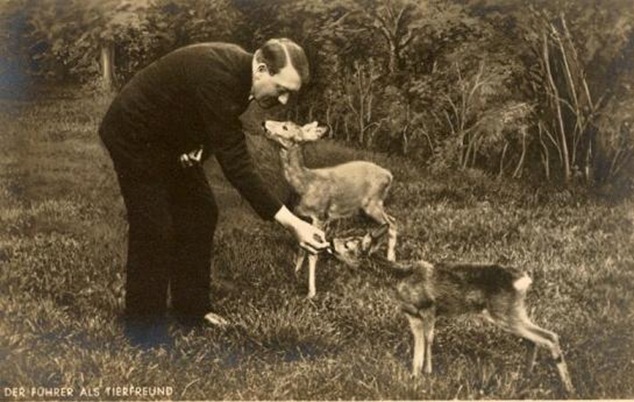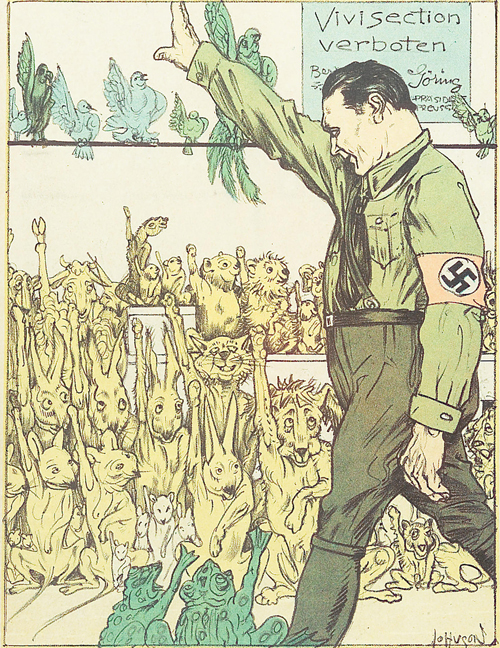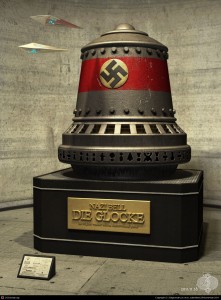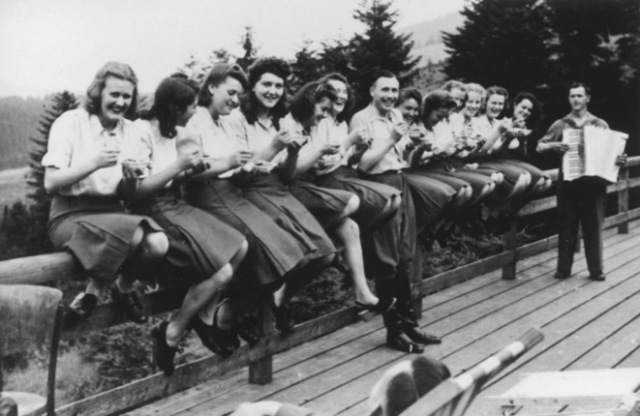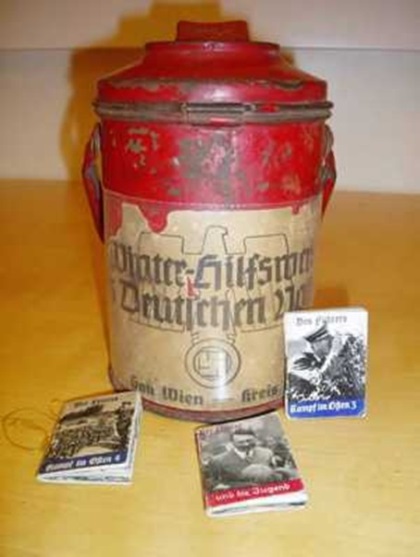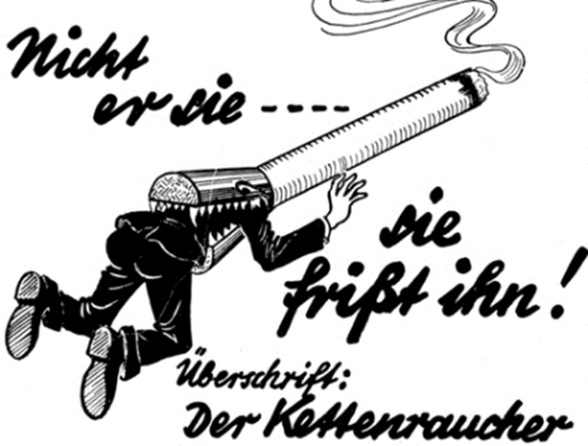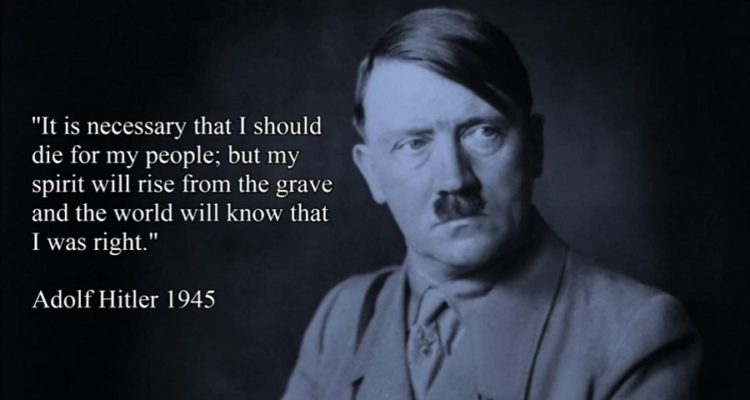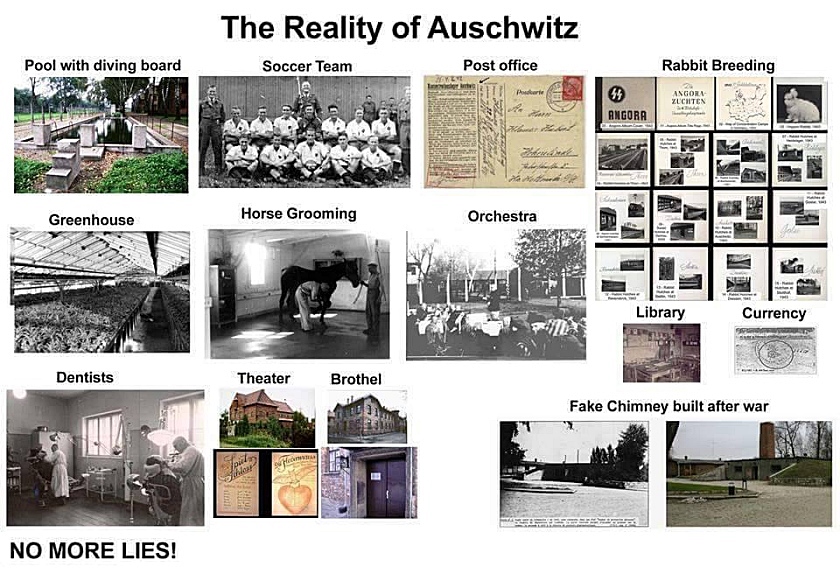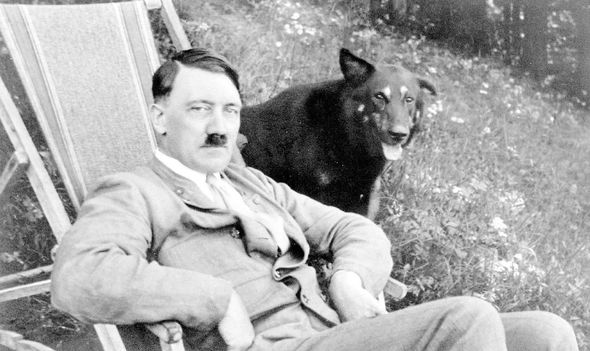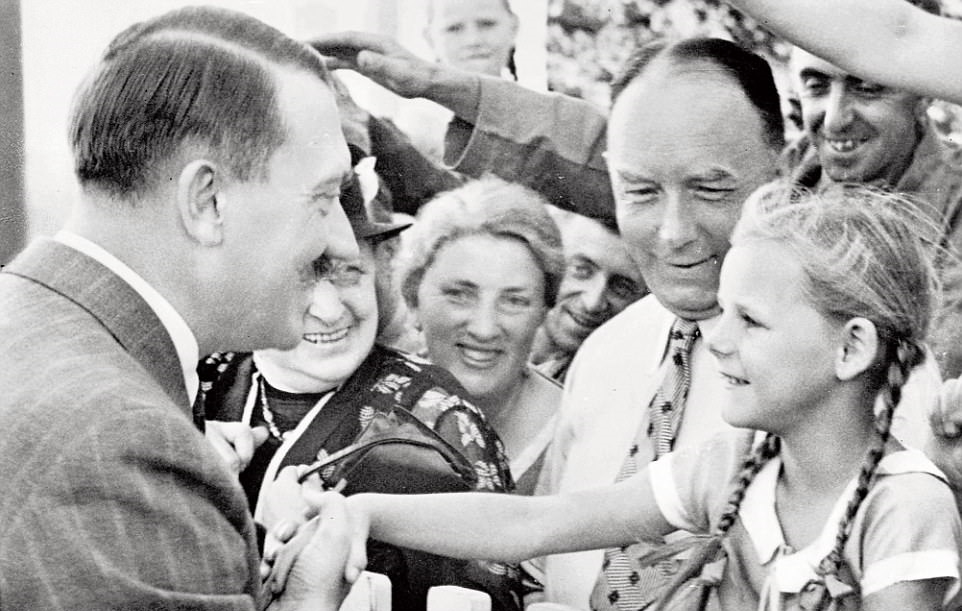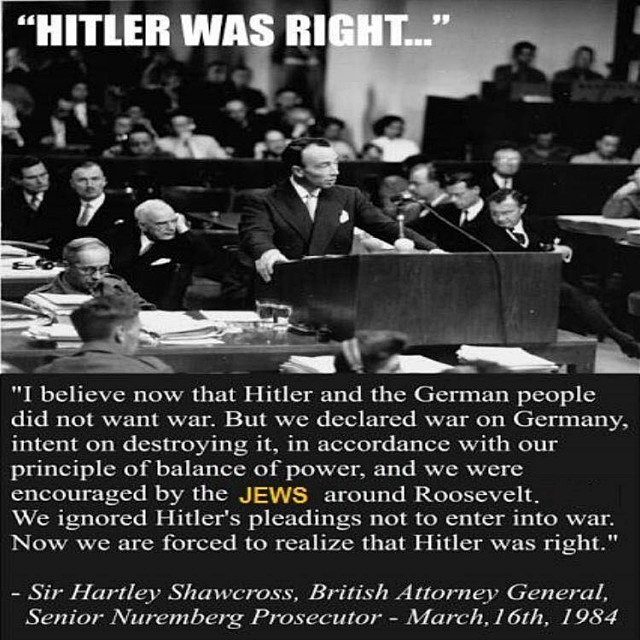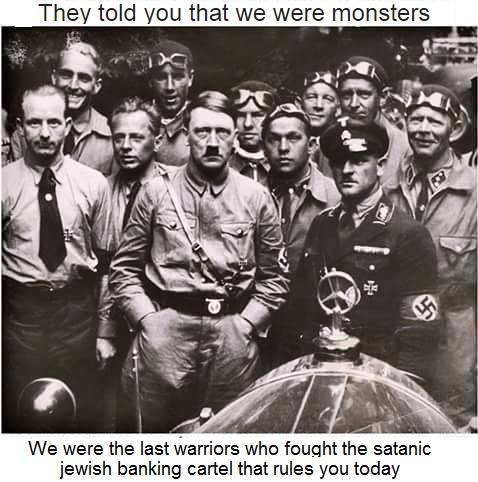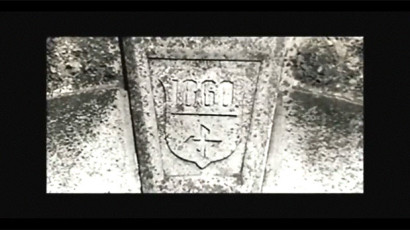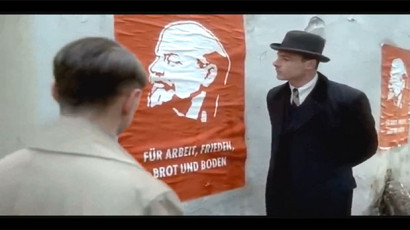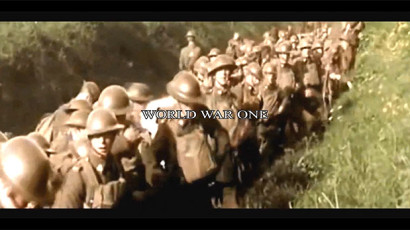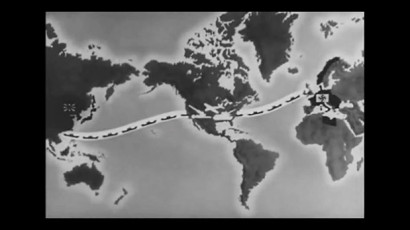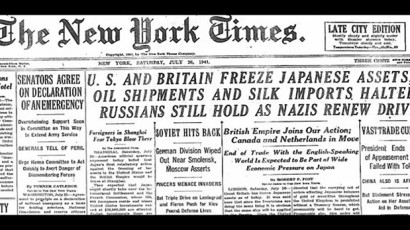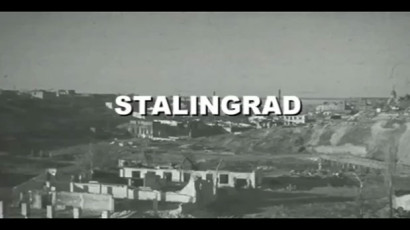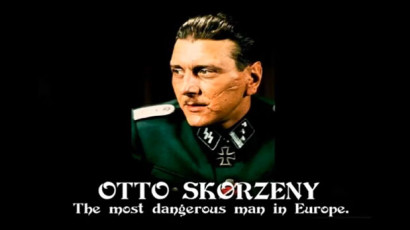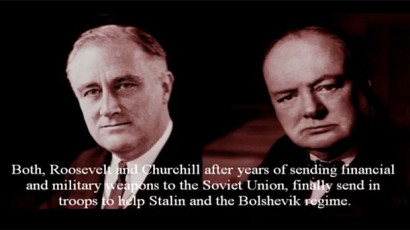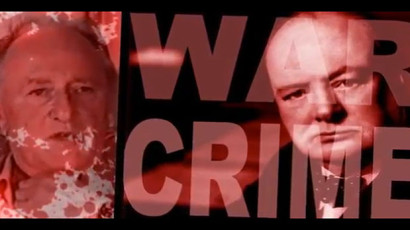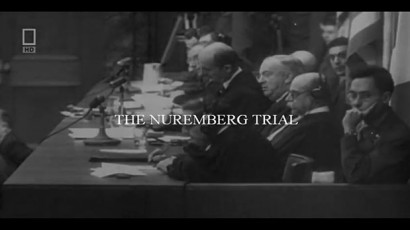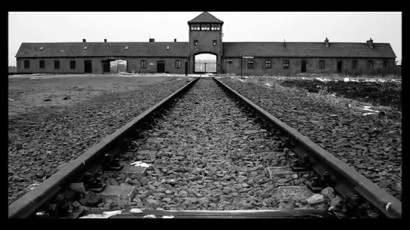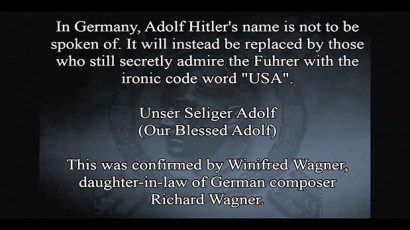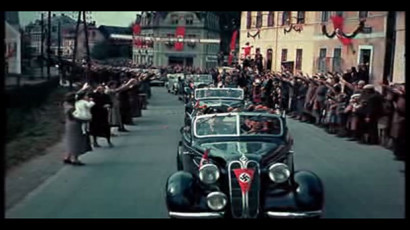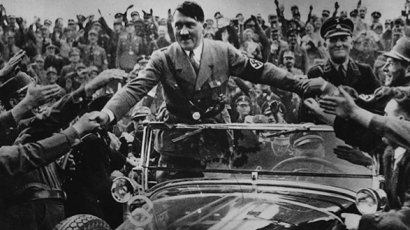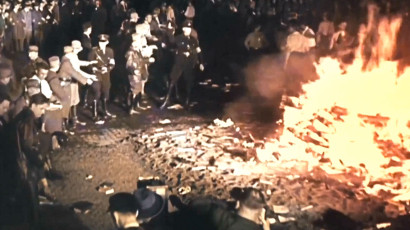|
|
Click on this text to view THE GREATEST STORY NEVER TOLD... . . Or click on this text to view Adolf Hitler The greatest story Never told Full 6 hours Documentary...  Click on this text to visit the GREATEST STORY NEVER TOLD website... . . . . Click on this text to see Hitler interacting with the celebrities of his day. . .
The epic documentary Adolf Hitler, The Greatest Story Never Told by Dennis Wise is breaking barriers and challenging perceptions on a global scale.
This ground-breaking documentary chronicles the rise of Germany from defeat in World War I, to communist attempts to take over Germany; hyperinflation during the Weimar Republic, widespread unemployment and misery, and Adolf Hitler’s rise to power.
It also reveals a personal side of Adolf Hitler: who he was, his family background, his artwork and struggles in Vienna and what motivated him to come to power.
After painstaking research Dennis has produced a comprehensive, unbiased, objective picture of what really happened during the World Wars, and why Adolf Hitler’s story is The Greatest Story Never Told.
Watch this series and uncover the real root causes of World War II. Do your own research and decide what you choose to believe.
Think differently.
. . The Polish Atrocities against the German Minority in Poland. http://www.balderexlibris.com/index.php?post/Schadewaldt-Hans- The-Polish-Atrocities-against-the-German-Minority-in-Poland
Atrocities: Should They Be Saying Sorry Instead? http://www.renegadetribune.com/poland-seeks-compensation- germany-wwii-atrocities-saying-sorry-instead/
Started WWII & Blamed Hitler & Germans For Eternity! http://www.renegadetribune.com/blank-check-forked-tongues- britain-poland-started-wwii-blamed-hitler-germans-eternity/
http://tomatobubble.com/id723.html
https://www.youtube.com/watch?v=q3V3D1aio_U
The DANZIG MASSACRES in 1939 By BOLSHEVIK JEWS https://www.youtube.com/watch?v=K4xqUvUqy-4 THE MAN WHO STARTED WORLD WAR II http://www.tomatobubble.com/smigly_rydz.html
https://www.youtube.com/watch?v=W4nTsIl0Xkk
________________________________________________
THE SO CALLED "NIGHT OF THE LONG KNIVES"
When the NSDAP – via popular vote -- finally came to power in 1933, the militarily powerful and treasonous Strasser - Roehm faction plotted the violent overthrow of Hitler – a coup attempt which surely would have plunged a still very unstable Germany into a horrible and protracted civil war. Under the proactive leadership of Hitler, Herman Goring and Heinrich Himmler, the conspiracy was thwarted in 1934 by Operation Hummingbird (hyped-up
as the so-called “Night of the Long Knives” by the Fake News of Britain). Gregor Strasser and Ernst Roehm -- the homosexual leftist leaders of the powerful paramilitary SA "Storm Troopers / Brown Shirts" -- were executed. Given the sympathetic coverage for the executed traitors of Germany in the British press, it seems more likely that Strasser and Roehm -- were the British agents, not Hitler!
_________________________________________________________
. Click on this text to see: Obersalzberg Now & Then: the Mountain Retreat of Adolf Hitler... Click on this text to visit the TRUTH WILL OUT FILMS website to purchase DVD if you please... _____________________________________________________________________________
Adolf Hitler: One of the Good Guys – 12 Things you werenot told about Adolf Hitler and National-Socialist Germany and 10 Reason why Hitler was one of the Good Guys From: http://entityart.co.uk/ This article is two articles combined – made by other people. They have excellent information in them. I have also added two extracts from Adolf Hitler speeches at the end – which demonstrate what national socialism was really all about – community, family, comradery, altruism etc – as well as this I have added a gallery of Adolf Hitler images showing him with the German people and with animals… this man was not an evil tyrant.
Open your mind – you have been lied to about Adolf Hitler and National Socialism incessantly – from the moment you were born. There is a reason for this.
Here is an overview of 12 Things you were not told about Adolf Hitler and National-Socialist Germany:
1. Hitler Broke Free from the International Banking Cartels 2. Hitler Created a Thriving Economy with No Unemployment 3. Hitler Emphasized Respect for Women, Children and Strong Family Values 4. National-Socialist Preservation of Environment and Animals 5. Hitler Banned Experimentation on Animals (Vivisection) 6. Hitler Funded Research into “Free Energy” Technologies 7. German Workers Were Well-Treated 8. Organized Industrial Production & Farming 9. Hitler Eliminated Crime and Improved Health of Germans 10. No Citizen Will Starve or Freeze 11. The National-Socialist Anti-Tobacco Mission 12. National-Socialists Created a Culture that Cherished Music
Here is an overview of 10 Reason why Hitler was one of the Good Guys: 1/. He never wanted to kill any Jews 2/. He cared about conditions for the Jews in the work camps 3/. He had compassion for other sentient beings 4/. He tried to prevent the destruction of his fellow Europeans 5/. He cared passionately about his people and German heritage 6/. He was a humble man, from a humble background 7/. He held correspondence with Mahatma Gandhi 8/. He was a man of God 9/. He implemented cultural and social reform 10/. He stamped on usury / eliminated debt slavery
Article 1:12 Things you were not told about Adolf Hitlerand National-Socialist Germany
“After visiting these places, you can easily understand how that within a few years Hitler will emerge from the hatred that surrounds him now as one of the most significant figures who ever lived.”
Adolf Hitler was raised in a middle class family, and during the early years of his life his family even went through a difficult period of starvation. After being a soldier in World War I, on January 30th 1933, he found himself head of the German government, fulfilling the dream of every poor and middle class person who ever sought to make it big.
We are all familiar with the story of Hitler that the United States would like you to believe. Hitler has been made out to be one of the most “evil” people to have ever lived, slaughtering millions of innocent Jews. This same story has been echoed throughout Hollywood for
decades, and by now it’s safe to say billions of dollars have been spent to convince you of this black and white, good vs evil perspective about the National-Socialist regime. What if it isn’t entirely accurate?
After investigating the work of others who have documented history in an unbiased fashion, as well as those who have interviewed people who worked and lived alongside Hitler, there is strong evidence to suggest that what we’ve been told is extremely inaccurate. A completely new examination of Hitler and National-Socialist Germany during World War II is required, and from this examination a different story is sure to emerge.
Here are 12 things you were not told about Adolf Hitler and National-Socialist Germany:
1. Hitler Broke Free from the International Banking Cartels
When Hitler’s period as Chancellor of Germany began, the German people had no work, no money and were starving. A wheelbarrow full of 100 billion-mark banknotes could not buy a loaf of bread at the time, and many Germans were living in shacks after countless homes and farms had been seized by Rothschild/Rockefeller-controlled banks.
In his 1967 book The Magic of Money, Hitler’s Reichsbank President, Dr. Hjalmar Horace Greeley Schacht, let out the big secret:
“The mark’s dramatic devaluation began soon after the Reichsbank was “privatized,” or delivered to private investors.”
In other words, responsible for the post-war hyperinflation was not the German government, but rather the privately owned central bank in Germany, and its monopoly it had over the creation of money. Germany’s economy was crashed and devastated by bankers… that is, until Hitler arrived.
After Hitler was elected, refusing to play ball with the Rockefeller-Rothschild rules, one of the first things he did was fix the corrupt, debt-based financial system. By completely thwarting the international banking cartels, the National-Socialist government issued its own currency known as Reich Marchs, which were debt free and uncontrollable by international financial interests.
Debt Free Finance = Freedom
If America nationalized their currency as Hitler did for Germany, they would effectively sever all ties with international bankers, the manipulation of their government and economy would cease, and they would live debt-free. Just as Hitler issued debt-free currency for Germany, Abraham Lincoln setup an interest free banking system in the United States when he was President, and he was murdered for it. Former US president Andrew Jackson issued interest-free currency, and two shots were fired at his head in an assassination attempt, but the shots misfired and he survived. John F. Kennedy issued interest-free currency during his presidency and we all know how he met his untimely demise.
After Germany’s public banking system was installed, world Jewry responded by declaring war on Germany, including a global boycott of German goods. Within two years, the German economy was flourishing with its new-found stable, and inflation-free currency.
2. Hitler Created a Thriving Economy with No Unemployment
After setting up a public banking system, Hitler began his reign by constructing new roads, bridges, dams, canals, port facilities, and much needed repair of public and private buildings.
Everything was done with public money that owed no interest to the International “Banksters”. As Hitler said, “For every Mark issued, we required the equivalent of a Mark’s worth of work done, or goods produced.”
Next, the NATIONAL-SOCIALIST government encouraged women to be homemakers, and all the work being done to repair and improve the country’s infrastructure and transportation created jobs for men. The unemployment problem had been solved within only two years, and Germany was back on its feet.
It’s often been claimed, that Hitler’s success in reviving his nation’s economy was based largely on government spending for rearmament. This is a myth. As the renowned British historian A. J. P. Taylor noted: “Germany’s economic recovery, which was complete by 1936, did not rest on rearmament; it was caused mainly by lavish expenditure on public works, particularly on motor roads, and this public spending stimulated private spending also, as [British economist John Maynard] Keynes had said it would. …while nearly everyone else in Europe expected a great war, Hitler was the one man who neither expected nor planned for it.” – A. J. P. Taylor, From Sarajevo to Potsdam (Harcourt Brace Jovanovich, 1975), p. 140.
3. Hitler Emphasized Respect for Women, Children and Strong Family Values During the economic hardship just before Hitler was elected, Germany was seeing a declining rate of birth. In 1933, hitler passed a law that enabled married couples to obtain interest free loans minimum 1000 Reich Marks (equal to 9 months salary) to set up homes and start families.
For each child birthed, the couple was allowed to keep 250 marks and did not have to repay it. This system pioneered by the National-Socialist government exists today in Switzerland. In the eyes of Nazis, women were viewed as the preservers of the tribe, the guardians of future generations, and the priestesses of domestic virtue.
Recognizing that families are the primary unit around which a functioning society is built, Hitler emphasized the principle of maintaining a strong bond among family members. Admired for his high regard for mother’s, families were inspired and strengthened under the leadership of Hitler.
Poor families were helped by using financial incentives, and family allowances, marriage loans and child subsidies were provided equally to each and every segment of society.
4. National-Socialist Preservation of Environment and Animals Under the National-Socialist regime, mishandling an animal was considered a heinous crime, and if somebody was discovered mistreating an animal, they were sent to [work] camps. As someone with great admiration for animals, Hitler showed great concern for animals native to Germany, and passed laws that ensured their safety and well-being.
In 1934, Hitler passed a law called Das Reichsjagdgesetz (the Reich Hunting Law), which regulated how many animals could be killed per year, and to establish proper ‘hunting seasons’. This law has now been adopted by most western countries.
Animal conservation was included in Primary, Secondary and College levels, and in 1935, the Reichsnaturschutzgesetz (Reich Nature Protection Act) was passed. which placed several native species on a protection list including the wolf and Eurasian lynx. It is likely that this law saved some native forest-inhabiting species from going extinct.
The Nazi’s were also the first to create environmental protection laws in history. The German Imperial Conservation law of 1935 was passed, which protected “remaining portions of landscape in free nature whose preservation on account of rarity, beauty, distinctiveness or on account of scientific, ethnic, forest, or hunting significance lies in the general interest.”
“[It is] useful to know the laws of nature – for that enables us to obey them. To act otherwise would be to rise in revolt against heaven.” – Adolf Hitler
Hitler was a well-known lover of animals.
5. Hitler Banned Experimentation on Animals (Vivisection) ‘Nazi’ Germany was the first country in the world to ban vivisection, or any experimentation on live animals. With its great concern for animal conservation, and human treatment, a complete ban of vivisection was enacted in April 1933.
The Prime Minister of Prussia Hermann Goring has said:
“An absolute and permanent ban on vivisection is not only a necessary law to protect animals and to show sympathy with their pain, but it is also a law for humanity itself…. I have therefore announced the immediate prohibition of vivisection and have made the practice a punishable offense in Prussia. Until such time as punishment is pronounced the culprit shall be lodged in a concentration camp.”
(Above) This German cartoon depicts animals that were saved from vivisection saluting Hermann Goring. The sign in the window reads “Vivisection Forbidden”.
6. Hitler Funded Research into “Free Energy” Technologies Hitler was well aware that in order to truly escape the stronghold of economic manipulation by the international banking cartel he would need to find a way to eliminate Germany’s dependence on oil. An inexhaustible source of energy that was not monopolized by the private money cartels was required for true sovereignty, and this is what Hitler sought.
This pursuit led Germany to develop what has been called The Nazi Bell, which is described by author Joseph P. Farrell as “a hyper-dimensional physics device being researched under the auspices of the SS departments Entwicklungstelle-IV, Forschung, Entwicklung, und Patente, and SS General Hans Kammler’s super-secret weapons black projects think-tank, the Kammlerstab.“
According to Farrell, “the mission brief of the Entwicklungstelle IV was to develop free energy and to make Germany independent of foreign oil.”
The National-Socialist Bell was designed, in Farrell’s estimation, for a threefold purpose:
Energy Independence
In his book Babylon’s Banksters, Joseph P. Farrell points to evidence that after the War, the United States made every effort to reconstruct the personnel team that worked on the National-Socialist Bell, so that they could develop the technology for themselves and restore the balance of power between “National-Socialist International” and “Anglo-American” elite factions.
7. German Workers Were Well-Treated With the goal of enhancing the standard of living for all German citizens equally, Adolf Hitler stimulated the spirit of integrity, comradeship and happiness, by funding numerous worker’s welfare programs including:
– Highly Subsidized International vacation trips.
2 million people went on cruises, and – 11 million went on theater trips.
that all workers had to join the German labor Front trade
union. rooms, even playing fields and swimming pools for its workers.
During the Third Reich, German workers were better treated than at any time before, or since.
8. Organized Industrial Production & Farming
As opposed to the current American economy, where production is driven by the pursuit of maximum profit, Hitler initiated a policy of self-sufficiency, where the goal was to produce only what is required by Germans. The goal of the National-Socialist government was to produce for its country everything the German people needed without having to rely on imports to meet the needs of its citizens.
Along with the calculated production of material goods, new policies were introduced so that the aim of farming was to produce what German’s needed, not what was most profitable. The government subsidized the farmers for loss of profit and farmers were given guarantees that all of what was grown would be purchased.
9. Hitler Eliminated Crime and Improved Health of Germans
By giving social misfits and criminals jobs, Adolf Hitler was able to reduce the crime rate in Germany. In his 1976 book The Twelve-Year Reich, author R. Grunberger stated that there were significant drops in the rates of murder, robbery, theft, embezzlement and petty larceny during the Hitler years.
Many foreigners were impressed by the improved outlook and health of Germans, including Sir Arnold Wilson, a British M.P. who visited Germany seven times after Hitler came to power.
“Infant mortality has been greatly reduced and is considerably inferior to that in Great Britain,” wrote Wilson. “Tuberculosis and other diseases have noticeably diminished. The criminal courts have never had so little to do and the prisons have never had so few occupants. It is a pleasure to observe the physical aptitude of the German youth. Even the poorest persons are better clothed than was formerly the case, and their cheerful faces testify to the psychological improvement that has been wrought within them.”
10. No Citizen Will Starve or Freeze A canister used for collections during the Winter Relief Fund.
A prime philosophy of Germany at the time was that all citizens should share the same standard of living. With this in mind, National-Socialist Germany boasted one of the largest public welfare programs in history with the slogan “None shall starve nor freeze”. Every year, high-ranking Nazi’s and citizens would take to the streets to collect charity for the unfortunate, which generated a feeling of comradeship toward those in need.
They even went to the extent of publishing names of those who didn’t give charity in the paper as a punishment or reminder of their neglect. According to Mark Weber of the Institute for Historical Review,
“On one occasion, a civil servant was prosecuted for failure to donate, and his argument that it was voluntary was dismissed on the grounds it was an extreme view of liberty, to neglect all duties not actually prescribed by law, and therefore an abuse of liberty.”
11. The National-Socialist Anti-Tobacco Mission National-Socialist doctors were the first to write a major scientific paper linking smoking to lung cancer. Following this report, smoking was banned in restaurants and public transportation systems. Advertising of smoking and cigarettes was severely regulated by the Nazis, and tobacco tax was raised to deter people from smoking. In what was one of the most expensive and effective anti-tobacco movements in history, numerous German health organizations began educating the public that risks of miscarriage were heightened when pregnant women engaged in smoking.
National-Socialist Anti-Tobacco Ad: “He does not devour it, it [the cigarette] devours him!”
In the year 1940, while annual cigarette consumption per capita in America was over 3,000, in Germany it was only 749.
Hitler prohibited the sale of cigarettes to women.
12. National-Socialists Created a Culture that Cherished Music
Recognizing the importance weaving music into the fabric of a country rich in culture, Hitler founded the State Music Institute in 1933 after he came into power. Its purpose was to promote the timeless work of composers such as Beethoven, Mozart, Brahms, Wagner, among others. The Nazis ensured that every German citizen had a radio.
Youngsters were encouraged by the National-Socialist government to pursue music as a career in order to preserve the rich ancient German cultural heritage.
Source: Article 2:10 Reason why Hitler was one of the Good Guys – by Digger
All these points are verifiable. They just take a bit of objective, independent research.
1/. He never wanted to kill any Jews
Whenever you hear anyone espouse (repeat) the lies about Hitler the nasty Jew-killer. Please always make a point of asking this very simple question: “Where did you get that information from?”
Perhaps we all at some point have repeated this fable. Why would we not, when it’s shoved down our throats 24/7, year in year out for decades(?) There hasn’t been a man on this planet who has been demonized as much as Herr Hitler.
If Hitler wanted to kill Jews, why oh why throughout all his speeches and manuscripts and his book Mein Kampf did he not mention this? Did he just forget? No, he didn’t say or write it BECAUSE HE HAD NO INTENTION OF KILLING THE JEWS.
No matter what amount of destruction he had observed done by the Jews to his people; he had enough self-discipline and ethical code not to take revenge. Being a strong character, he was able to rise above the darkness, the demonic standards of the Judaic mindset and show self-restraint and humility.
That is why he created ‘containment work camps’ for the Jews and certainly NOT death camps.
2/. He cared about conditions for the Jews in the work camps
Unbeknown to billions of people the Nazi camps were not death camps, nor were they places to carry out human experiments. They were simply containment camps. Something had to be done with these destructive anti-social Jews who were strangling Germany. Thanks to the Jews, Germany had lost it’s moral code and had become debased and de-cultured, does that ring a bell?
Something had to be done! And Hitler did do something – he placed all the Jews in containment camps to allow Germany to breath again. But – this is the key point in this essay/piece. He did it in a way which was ethical. The camps had decent sufficient food (bearing in mind it was war time), they had theaters, swimming pools, football pitches, post offices where inmates could communicate to the outside world, kindergartens, art and music recreation and even prostitutes.
Quality sanitation within the camps was paramount and that is why the inmates clothes were regularly de-loused with Zyklon B gas. There were no human gas chambers…… THAT IS A BIG FAT KOSHER LIE; to which the world has had to endure for over half a century.
My theory is that if there had not have been a war effort, Hitler would not have even made the Jews work. AND I bet you the containment camps would have been luxury rehabilitation centers. In order to slowly de-programme the Jews from their mind control cult.
3/. He had compassion for other sentient beings Many historians claim he was a vegetarian. I believe this is true, but whether it is or not, the point is he had a clear connection and affection for his fellow creatures. I’m not suggesting just because he may have been a veggie that therefore he was a good person; but this was a man of compassion and that he recognised the importance of compassion in society. He had so much affection for his German shepherds (picture below with his beloved dog). He banned all animal experimentation, recognising it to be evil. Hitler could see the connection between all life forms. It was his level of consciousness. Respect for nature, animals and human life.
4/. He tried to prevent the destruction of his fellow Europeans
Numerous occasions Hitler tried to warn and assist his fellow brethren about the Jewish trap they had fallen for and who really was behind all the warmonger. He dropped fliers from planes trying in vein to prevent Germany and Britain fighting. He initially wanted to make alliances with Britain. Many occasions he gave opportunities to opposing European forces, where he could have slaughtered them. It was his internal spiritual angst for him to be fighting (defending) amongst his European brothers and sisters. He did all he could to avoid war, he was not the warmonger we all have been led to believe.
5/. He cared passionately about his people and German heritage Hitler observed the degrading machinations of the Jews in Austria and Germany. It not only disgusted and angered him, but saddened him to see how these two nations were being destroyed from the inside out like a cancer – a cancer that his sleepy folksmen could not see. The exact same angst those of us who are Jew-conscious find ourselves in. He was a man who cared about society, a man who cared about culture, who cared about nature, about moral values and about building and improving as opposed to destroying and degrading.
He was a man who had fought for his country, in the trenches and been hospitalized for his country. How many of our sell out politicians today can claim that? He was a true spokesman of the people, for the people who had diligently worked his way up from grass roots. From microcosmic pep talks to his fellow workman on building sites, to talks in beer houses, to speeches in basements, to town halls. As well as all the behind-the-scenes work and risks. Slung in jail, mocked and defamed. Endless tireless work to resolve the destruction of his peoples.
I would also strongly suggest he cared about all peoples. Yes, including black people, despite the kosher myth he was a supremacist racist.
6/. He was a humble man, from a humble background Can any of us name one present western politician who can claim that these days? No, today they’re all criminals, fed through the kosher criminal system. All built on materialistic gain and kudos. All content with serving the beast for their demonic and self-serving interests. Their greed and hubris having no boundaries.
Hitler worked on building sites as a laborer for crying out loud. How many of these leaches under the guise of politicians do you know have that background? He was also a humble street artist, barely scraping a living together. Some days he had to decide whether to spend his meager earnings on a political book, or to eat – he opted for the former. Now that is passion in politics and a drive for social reform.
7/. He held correspondence with Mahatma Gandhi
This alone doesn’t necessarily suggest he was a good person. But more that Gandhi and Hitler were in alignment on many issues. They both recognized the evil force they were up against and both were coming from a humanitarian position. The bottom line is Gandhi would not have corresponded with a so-called evil mad dictator hell bent on wanting to kill the Jews and rule the world.
8/. He was a man of God
Hitler was NOT an atheist – despite what the Jewish propaganda machine wants us to believe. He often made references to God and spoke in terms of a Divinity. He was somebody who could clearly make the connection between Divine law and Natural laws. He was spiritually and morally driven throughout all his political career. Read his book Mein Kampf to see his consistent reference to Christian values.
9/. He implemented cultural and social reform
Throughout Hitler’s political career, his common theme was about ‘cleaning up’. He had seen the filth the Jews had created and desperately wanted Germany to reverse these degrading trends. He banned supermarkets, because he wanted local small businesses to prosper. He banned degrading modern art, as he recognised it for what it was. He banned vivisection (animal experiments), because in his wisdom he could see how futile and unnecessary they were.
He encouraged healthy youth activities and social programmes to enhance cultural pride and individual self worth, such as sports and recreational activities. He encouraged men to be men and women to be feminine. He helped develop beauty, cleanliness and pride back into the German people.
10/. He stamped on usury / eliminated debt slavery
This subject links in most of the points in this list and what Hitler achieved as a leader. But I thought it was essential that this topic was highlighted in isolation, as it was probably the single most important act of bravery and compassion Hitler offered to his people. Unfortunately this act alone was enough to piss off the Jewish IMF and therefore create WW2.
Usury is the elite Jews most powerful and demonic weapon amongst their whole armament of destructive weapons. More powerful than their poisons and even their mind control techniques. Because it’s their use of compound interest that enables them to create a stranglehold on every industry and therefore every level of society. Nobody can escape usury – everybody is infected by it.
That is why Hitler created his own independent currency as a first move when he came to power. And hey presto – that is why Germany was able to get back on it’s feet and flourish as all nations should. Hitler recognised the judaic invention of usury as unlawful, ungodly and unnatural – and as a talmudic curse which has crippled every host nation the Jews have entered into and ultimately, that which brings about their demise.
Hitler freed his people of this curse.
In Conclusion
Hitler was probably the hero of the second world war and the 21st century. A man of ethical courage, a man of spiritual perception and good intent. A spiritual soul who cared – cared about all life forms, all cultures, about goodness and Light and ultimately about Truth.
Because he was one of the good guys.
Source: Two Adolf Hitler speeches – Demonstrating much of what NationalSocialism is really about: Community, Comradery, Altruism…
You can watch these speeches on YouTube – search: This is National Socialism
Hitler Speech Extract 1- National Socialism: Community and Altruism
“A new community is being built in Germany, and it is our most beautiful goal and aim. Those who can’t even see past their own nose deserve our pity more than anything else. It is the luck to help, which rewards those who commits themselves to this socialist state, and this commitment must happen every new winter. Our social welfare system is so much more than just charity. Because we do not say to the rich people: Please, give something to the poor. Instead we say: German people, help yourself! Everyone must help, whether you are rich or poor! Everyone must have the belief that there’s always someone in a much worse situation than I am, and this person I want to help as a comrade. If one should say: Yes, but do I have to sacrifice a lot? That is the glory of giving! When you sacrifice for your community, then you can walk with your head held up high…”
Hitler Speech Extract 2 – National Socialism: German Youth and Comradery
“A new state cannot simply fall down from the sky, instead it has to grow from within the people. Because when I need loyalty, belief, confidence, fanaticism and commitment, then I must turn to where I can still find these values, and these values can always be found in the people themselves, in the masses of the people!
My German youth, just as we’re gathered here, my young comrades, as part of the life of the people, so must the rest of the people. It was not always so. In the past, people did not want to understand each other. Each thought only of themselves. At best, their class alone. We have been witnesses to the consequences of this aberration of the spirit. In your youth you must safeguard that which you possess, the great feeling of comradeship of being part of the group. If you hold on to this, then there is no force in the world who can take it from you. You will be one people bound together as tightly as you are now. As German youth, our only hope, the courage and faith of our people. You, my youth, are indeed the living guarantee of the living future of Germany – not an empty idea – not an empty formalism, or an insipid plan. No! You are the blood of our blood, the flesh of our flesh, and the spirit of our spirit. You are the continuation of our people…”
A link to a video of these Hitler Speeches: https://153news.net/watch_video.php?v=DNUADN8MHWHY
__________________________________________________________________________________________________________________________________
____________________
Rochus Misch, Adolf Hitler's Loyal Bodyguard Rochus Misch, who served as Adolf Hitler's devoted bodyguard for most of World War II and was the last remaining witness to the great german leader's final hours in his Berlin bunker, has died just few years ago.
He was 96 and died in Berlin after a short illness. Misch remained proud to the end about his years with Hitler, whom he affectionately called "boss." In a 2005 interview with The Associated Press, Misch recalled Hitler as "a very normal man" and gave a riveting account of the Führer's last days before he and his wife Eva Braun killed themselves as the Soviet Red Army closed in around their bunker in Berlin.
"He was no brute. He was no monster. He was no superman," Misch said.
Born July 29, 1917, in the tiny Silesian town of Alt Schalkowitz, in what today is Poland, Misch was orphaned at an early age. At age 20, he decided to join the SS — an organization that he saw as a counterweight to a rising threat from the left. He signed up for the Leibstandarte SS Adolf Hitler, a unit that was founded to serve as Hitler's personal protection.
"It was anti-communist, against Stalin — to protect Europe," Misch said. "I signed up in the war against Bolshevism, not for Adolf Hitler." But when Germany invaded Poland on Sept. 1, 1939, Misch found himself in the vanguard, as his SS division was attached to a regular army unit for the blitzkrieg attack.
Misch was shot and nearly killed while trying to negotiate the surrender of a fortress near Warsaw, and he was sent to Germany to recover. There, he was chosen in May 1940 as one of two SS men who would serve as Hitler's bodyguards and general assistants, doing everything from answering the telephones to greeting dignitaries.
Misch and comrade Johannes Hentschel accompanied Hitler almost everywhere he went — including his Alpine retreat in Berchtesgaden and his forward Wolf's Lair headquarters.
He lived between the Fuehrer's apartments in the New Reich Chancellery and the home in a working-class Berlin neighborhood that he kept until his death.
"He was a wonderful boss," Misch said. "I lived with him for five years. We were the closest people who worked with him ... we were always there. Hitler was never without us day and night."
In the last days of Hitler's life, Misch followed him to live underground, protected by the Fuehrerbunker's heavily reinforced concrete ceilings and walls.
"Hentschel ran the lights, air and water and I did the telephones — there was nobody else," he said. "When someone would come downstairs we couldn't even offer them a place to sit. It was far too small."
After the Soviet assault began, Misch remembered generals and NS brass coming and going as they tried desperately to cobble together a defense of the capital with the ragtag remains of the German military.
He recalled that on April 22, two days before two Soviet armies completed their encirclement of the city, Hitler said: "That's it. The war is lost. Everybody can go."
"Everyone except those who still had jobs to do like us — we had to stay," Misch said. "The lights, water, telephone ... those had to be kept going but everybody else was allowed to go and almost all were gone immediately."
However, Hitler clung to a report — false, as it turned out — that the Western Allies had called upon Germany to hold Berlin for two more weeks against the Soviets so that they could battle communism together.
"He still believed in a union between West and East," Misch said. "Hitler liked England — except for (then-Prime Minister Winston) Churchill — and didn't think that a people like the English would bind themselves with the communists to crush Germany."
On April 28, Misch saw Propaganda Minister Joseph Goebbels and Hitler confidant Martin Bormann enter the bunker with a man he had never seen before.
"I asked who it was and they said that's the civil magistrate who has come to perform Hitler's marriage," Misch said. That night, Hitler and longtime mistress Eva Braun were married in a short ceremony.
Two days later, Misch saw Goebbels and Bormann talking with Hitler and his adjutant, SS Maj. Otto Guensche, in the bunker's corridor.
"I saw him go into his room ... and someone, Guensche, said that he shouldn't be disturbed," Misch said. "We all knew that it was happening. He said he wasn't going to leave Berlin, he would stay here."
"We heard no shot, we heard nothing, but one of those who was in the hallway, I don't remember if it was Guensche or Bormann, said, 'Linge, Linge, I think it's done,'" Misch said, referring to Hitler's valet Heinz Linge.
"Then everything was really quiet ... who opened the door I don't remember, Guensche or Linge. They opened the door, and I naturally looked, and then there was a short pause and the second door was opened... and I saw Hitler lying on the table like so," Misch said, putting his head down on his hands on his living-room table.
"And Eva lay like so on the sofa with knees up, her head to him."
Misch ran up to the chancellery to tell his superior the news and then back downstairs, where Hitler's corpse had been put on the floor with a blanket over it.
"Then they bundled Hitler up and said 'What do we do now?'" Misch said. "As they took Hitler out ... they walked by me about three or four meters away. I saw his shoes sticking outside the sack."
An SS guard ran down the stairs and tried to get Misch to watch as the two were covered in gasoline and set alight. "He said, 'The boss is being burned. Come on out,'" Misch recalled. But instead Misch hastily retreated deeper into the bunker to talk with comrade Hentschel.
"I said 'I saw the Gestapo upstairs in the ... chancellery, and it could be that they'll want to kill us as witnesses,'" Misch said. But Misch stuck to his post in the bunker — which he described as "a coffin of concrete" — taking and directing telephone calls with Goebbels as his new boss until May 2, when he was given permission to flee.
Goebbels, he said, "came down and said: 'You have a chance to live. You don't have to stay here and die.'" Misch grabbed the rucksack he had packed and fled with a few others into the rubble of Berlin.
Working his way through cellars and subways, Misch decided to surface after hearing German being spoken above through an air ventilation shaft. But the voices came from about 300 soldiers who had been taken prisoner, and the Soviet guards grabbed him as well.
Following the German surrender May 7, Misch was taken to the Soviet Union, where he spent the next nine years in prisoner of war camps before being allowed to return to Berlin in 1954. He reunited with his wife Gerda, whom he had married in 1942 and who died in 1997, and opened up a shop.
At age 87, when he talked with the AP, Misch still cut the image of an SS man, with a rigid posture, broad shoulders and neatly combed white hair. He stayed away from questions of guilt or responsibility for the "Holocaust", saying he knew nothing of "the murder of 6 million Jews".
_____________________________
THE UNKNOWN ADOLF HITLER
 Battlefield heroism knows no frontiers. However, it is difficult to identify any whose valour equals that of a WWI (1914 – 1918) volunteer who at the time was an unknown corporal.
Corporal Adolf Hitler saw frontline action at Yser, Ypres, Flanders, Neuve Chapelle, La Bassee, Arras, Artuis, Somme, Fromelles, Alsace Lorraine, Aillette, Montdidier, Soissons, Rheims, Oise, Marne, Champagne, Vosle, Monchy, and Bapaume.
During those terrible years, the future leader of the German people displayed exemplary courage in a conflict that involved more than forty battles. He was wounded on October 5, 1916, and hospitalised for two months. Then he was back at the front until October 15, 1918, when he was hospitalised again, this time for gas poisoning.
Hitler’s battlefield heroism was the stuff of legends and on a par with that of the Spartans of Thermopylae. Even Jews, notoriously hostile to the German statesman, were unstinting in their praise. That few people are aware of this is entirely due to the cowardliness of many palace publishers and media presstitutes.
Their spinelessness is such that they cannot honour their enemy; for thousands of years a European tradition. Hitler’s wartime record is not a matter of dispute and explains why recognition is muted, censored or lied about.
ADOLF HITLER THE WARRIOR
“He was a model of coolness and courage in both trench warfare and assault combat. He was always ready to volunteer for carrying messages in the most difficult and dangerous situations.” ~ Lieutenant Colonel Godin in his official request that Hitler be awarded the Iron Cross 1st Class.
“He was always ready to help out in any situation, always volunteered for the most difficult and most arduous, and the most dangerous missions, and to risk his life and wellbeing for the Fatherland. On a human level, I felt closer to him than to any of the other men.” ~ Statement by Colonel Anton Tubeuf further on the recognition being awarded.
“Hitler inspired all his comrades. His fearless courage and devotion to duty, particularly in combat impressed them. His qualifications, modesty, and his admirable sobriety earned him the greatest respect of his comrades and superiors alike.” ~ Great War veteran Colonel Spatny who commanded the 16th Regiment
“Hitler’s wartime record; campaigns, decorations, wounds, periods in hospital and on leave, is fully documented. In addition, there is evidence to show that he was comradely, level-headed and an unusually brave soldier, and that a number of his commanding officers singled him out for special mention.” ~ Werner Maser, former head of the Institute of Contemporary History at the University of Munich, author of the biography Hitler, Legend, Myth, and Reality (Harper and Row, 1971).
“Hitler was quick in mind and body and had great powers of endurance. His most remarkable qualities were his personal courage and daring which enabled him to face any combat or perilous situation whatsoever.” ~ (1922) General Friedrich Petz summary of the High Command’s appreciation of the self-effacing corporal Adolf Hitler.
“Hitler was a courageous and efficient soldier and was always a good comrade.” ~ Joachim Fest, German historian, and journalist.
“The courage and the composure with which he faced the most deadly fire made him seem invulnerable to his comrades. As long as Hitler is near us, nothing will happen to us, they kept repeating. It appears that made a deep impression on Hitler and reinforced his belief that he had been charged with a special mission.” ~ Joachim Fest, German historian, and journalist.
“In the course of the preceding months, he had escaped death on innumerable occasions. It was as though he had been wearing a good luck charm.” ~ John Toland, historian.
“Corporal Hitler was in all probability one of the German soldiers who got closest to Paris in 1918.” ~ French Historian, Raymond Cartier.
“Hitler had a fierce courage unmatched by anyone at the time or since.” ~ Sebastian Haffner, the Jewish writer who was fanatically anti-Hitler.
“He was a pleasant and likeable man who took an interest in the welfare of all his companions.” ~ Karl Hanisch, a Jew who shared lodgings with Hitler.
Karl Hanisch later recalled that his fellow lodger “. . . was neither proud nor arrogant, and he was always available and willing to help. If someone needed fifty hellers to pay for another night’s lodging, Hitler would always give whatever he had in his pocket without another thought. On several occasions, I personally saw him take the initiative and pass the hat for such a collection.”
__________________________________________________________________________
Click on this text to watch - In The Service Of The Führer Hitler's Shadow - Documentary
___________________________________________________________________________________________________________________________________________
|
